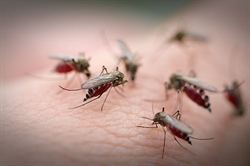
Mysterious New Mosquito-Borne Disease Found in Caribbean
Physicians in Haiti and researchers from the University of Florida (UF) have stumbled upon a patient infected with a rare virus that until recently has been confined to small outbreaks in the Amazon. Known as Mayaro virus, this pathogen belongs to the Alphavirus genus, is closely related to chikungunya, and produces a dengue-like illness that is often accompanied by long-lasting arthralgia (joint pain). Whether this case signals the start of a new outbreak in the Caribbean region or is an isolated incident is currently unknown.
The findings from the new report were published online in Emerging Infectious Diseases in an article entitled “Mayaro Virus in Child with Acute Febrile Illness, Haiti, 2015.”
"While current attention has been focused on the Zika virus, the finding of yet another mosquito-borne virus that may be starting to circulate in the Caribbean is of concern," explained senior study investigator Glenn Morris, M.D., director of the UF Emerging Pathogens Institute (EPI). "Hopefully we will not see the same massive epidemics that we saw with chikungunya, dengue, and now Zika. However, these findings underscore the fact that there are additional viruses 'waiting in the wings' that may pose threats in the future, and for which we need to be watching."
The Mayaro virus case was identified from a blood sample taken in January 2015 from an 8-year-old boy in rural Haiti. The patient had a fever and abdominal pain, but no rash or conjunctivitis. Since faculty from the UF Emerging Pathogens Institute were in the region during and after the 2014 chikungunya outbreak, plasma samples were obtained from febrile children and analyzed for the presence of chikungunya virus RNA using the genetic identification technique reverse transcription polymerase chain reaction, RT-PCR.
“Mayaro virus (MAYV) is a single-stranded positive RNA virus that was first isolated in Trinidad in 1954 and is one of the viruses that comprise the Semliki Forest virus complex,” the authors wrote. “Its transmission cycle is thought to occur mainly through mosquito vectors, especially those of genus Haemagogus, but Aedes spp. mosquitoes may also be competent vectors. The natural reservoirs of MAYV have been reported to be sylvatic (wild) vertebrates, mainly nonhuman primates but also birds and reptiles.”
The plasma samples were examined by UF researchers, in Gressier, Haiti, and were then sent to EPI for additional virology and molecular analyses, focusing on the detection of chikungunya, dengue, and Zika viruses. Interestingly, dengue virus was detected in the patient, in addition to a "new" virus —which was subsequently identified as Mayaro.
"The virus we detected is genetically different from the ones that have been described recently in Brazil, and we don't know yet if it is unique to Haiti or if it is a recombinant strain from different types of Mayaro viruses," concluded lead study author John Lednicky, Ph.D., an associate professor in the environmental and global health department at the UF College of Public Health and Health Professions.
The UF team and infectious disease agencies are working closely to keeping an eye on the situation in Haiti and other Caribbean nations to identify and potentially get out in front of any emerging outbreaks.



